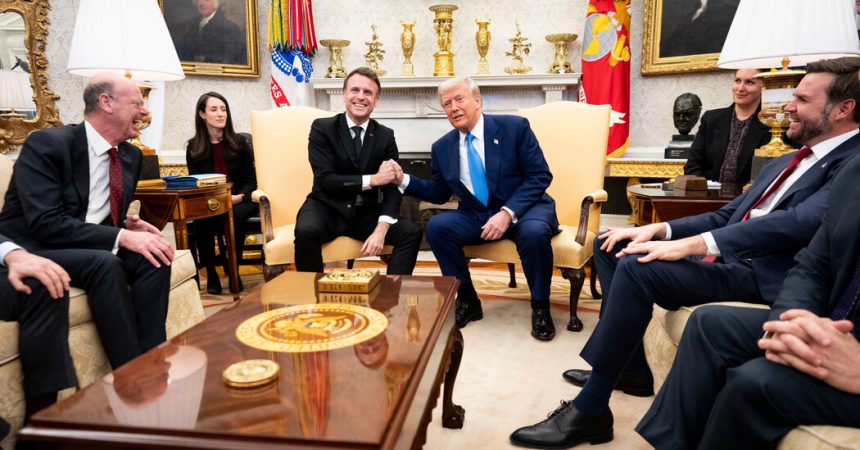President Trump welcomed President Emmanuel Macron of France to the White House on Monday at a time of growing tension over the future of the Atlantic alliance and peace talks with Russia that have sidelined Ukrainian and European leaders.
As the president greeted Mr. Macron at the entrance to the West Wing, the two engaged in a vigorous handshake in which both seemed intent on asserting masculine dominance, reminiscent of similar encounters during Mr. Trump’s first term. They then headed inside for a meeting in the Oval Office in advance of a joint news conference scheduled for 2 p.m. Eastern.
The meeting came on the third anniversary of Russia’s invasion of Ukraine, which Mr. Trump in recent days has blamed on Kyiv rather than Moscow. While other world leaders spent the day in Kyiv to show solidarity with the Ukrainians, Mr. Trump participated in a video call with other Group of 7 leaders and issued a statement offering no criticism of Russia for attacking its smaller, weaker neighbor.
Speaking with reporters in the Oval Office with Mr. Macron, Mr. Trump declined to call President Vladimir V. Putin of Russia a dictator, even though the president used the word last week to describe Volodymyr Zelensky, the democratically elected president of Ukraine. “I don’t use those words lightly,” Mr. Trump said.
Instead, he said he might go to Moscow if a peace deal is reached. That would make him the first American president to visit Russia in more than a decade and would be seen as a boon for Mr. Putin, who faces an international arrest warrant for war crimes.
Mr. Trump, who failed to broker an end to the war in 24 hours or before his inauguration, as he promised on the campaign trail, said the war could end “within weeks, if we’re smart.” He added: “If we’re not smart, it will keep going and we will lose young, beautiful people.”
The president emphasized his demand that Ukraine sign over hundreds of billions of dollars in mineral rights to repay U.S. military aid. “It was a lot of money and we had nothing to show for it,” he said. Treasury Secretary Scott Bessent said U.S. and Ukrainian negotiators were “very close,” at the “one-yard line.”
Mr. Trump’s return to power has convulsed relations with European allies as he threatens to impose tariffs on their consumer goods, demands that they increase military spending even beyond a previous target and breaks with them over Ukraine. Relations were inflamed by a speech in Munich by Vice President JD Vance suggesting that the biggest security threat to European nations is not Russia or China but their own political and cultural policies.
Mr. Macron has organized two meetings of European leaders to formulate a plan for dealing with an America that can no longer be depended on as an ally and hoped to use his visit to fortify Mr. Trump in negotiations over the fate of Ukraine.





